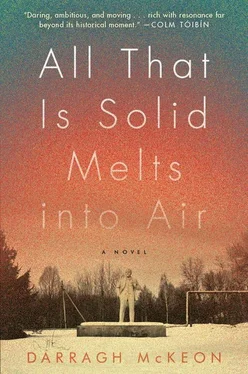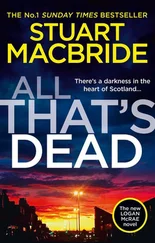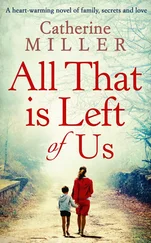“Well, they’re not yours. You don’t have any gold teeth.”
She was quiet; she let him realize it himself.
“They’re Grandmama’s.”
“Yes. I’m sorry. Plenty of people do it. Before she died, your grandmother made us promise we wouldn’t bury her with them.”
Artyom was quiet for a few moments.
“Are you angry?” she asked.
“No. I just didn’t know.”
“I’m sorry, Artyom.”
She didn’t speak until she could see he was ready to continue.
“I need to find your father. Things are getting desperate. We can’t stay here forever.”
“Okay.”
“These are the only things of value that we own. You’ll need one to bribe the guard. After that, only use them if you have to. I want you to find Maksim Vissarionovich, the man who brought us here. He’ll be kind to us. See if he knows someone—a nurse, a Party official. Anyone.”
“Where will I find him?”
“Look for rubbish bins on the street. Ask any rubbish collectors you come across. If you still can’t find him, go back to Lilya’s building and wait for him at his lock-up.”
“Okay. Do we know his last name?”
“No. I never asked.”
Artyom’s mother shook her head as she said this, regretting her stupidity. She was close to him; Artyom could smell her sour breath. She took his face in her hands.
“You know not to use any of the gold unless you have to.”
“Yes.”
She kissed him on the forehead.
“Thank you, Artyushka. And remember to come back. If you went missing too, I couldn’t bear it.”
“I should go now, shouldn’t I? Maksim will be working soon.”
“Yes, you should.”
Artyom knew she was watching him as he walked softly to the door, stepping over limbs that spilled into the passageway.
At the gate, when he had given one of the pieces of gold to the guards, he asked them to point him in the direction of the city centre, but they just shrugged; they weren’t from here.
So Artyom walked through the industrial wasteland, his first time alone in the city. He saw some crows gathered around a stray rubbish bag and kicked out at them, announcing his presence on the streets, and they exploded upwards, the group splintering as it gained height. He saw the smear of streetlights ahead and made his way in their direction, passing a textile factory and a car scrapyard. When he reached the main road he followed the flow of traffic, reasoning that, at this time of the morning, people would be heading towards the city. He walked for an hour, the pavement narrowing, trees becoming more prominent, grass aisles in the middle of the road. He looked everywhere, drank it all in. There were old houses made of stone, with stone-roofed porches. The buildings here were solid, were made to last.
Artyom found himself touching everything. Now that he could see it in daylight, had time to reflect on it, the city was different in every sensory way. Even the space of the city was completely unlike the spaces he was used to, with the rectangles of sky between buildings. The sweeping streets. Statues and chiselled lintels. Gateposts. The lines in the road. The big, green lane where the officials drove. The kerbstones. The railings. All of this not alien but odd, unlike anything he was used to.
His father was safe. He had to be. He was somewhere else in the city, confined in a different area. Looking for them, just as they were looking for him.
Eventually, Artyom stopped at a crossroads and saw a street with full rubbish bins taking up half the pavement outside the houses. Artyom stopped a passerby, a man with a long, gray coat, the top button dangling from a thread. He asked if the rubbish would be collected this morning, and the man opened his eyes wide, held his arm out, and pivoted around, displaying the rubbish bins in answer, and walked on.
Artyom sat at a bus stop and waited. Every ten minutes or so a bus would pull up and the driver would open the door for him, then shake his head in irritation when Artyom waved him onwards. There were so many cars on the street: Moskviches, Volgas, Russo-Balts, Vazes, Zaporozhetses. He was in awe of the lines and colour of them, listening to the roar of their engines. All of these, having come alive from the pages of the manuals, there in actuality, speeding along the road in front of him. He approached some of the parked cars and ran his hand along their contours, but a woman in the row of houses opposite shouted at him, told him to mind his business.
If Iosif were here they’d probably find a way to pop the bonnet on some of them and slaver over the engines. Iosif was so much more adventurous than he was. Artyom thinks he remembers Iosif saying he had an aunt in the city, so he’s probably being well looked after. He’s probably watching television at night and eating tinned peaches straight from the can. Although, maybe not. Things don’t always work out the way you expect. After all, Artyom had an aunt in the city too, so Iosif could be saying the same about him.
He was hungry. In the shelter they’d be handing round breakfast by now. There were so many people there at this stage that there were no more queues; the militia came around delivering bags with packages of food for each meal, collecting the bags when everyone had eaten. Artyom hoped his mother would save something for him. But of course she would, she was his mother.
He waited for a while and then approached one of the bins and rummaged around. Nothing. He dug through a few more. Near the end of the street he found the carcass of a chicken, some tea leaves stuck to it, bits of newspaper, but nothing he couldn’t pick off. He ran his fingers in the spaces between the legs and the body, scooped up slivers of white meat from between its ribs. Real meat. Now that he had a taste for it, he wanted to stuff the entire thing into his mouth, wanted to crunch on the bones until there was nothing left. He raised the carcass to his mouth and licked it, taking in some tea leaves but mostly enjoying the grease on his tongue.
“Hey. Get away from there.”
The rubbish collectors had rounded the corner. They hung from the truck in their bright orange jackets, staring at him. One of them stepped down.
“What are you doing? Get away, you fucking rat.”
Artyom wiped the grease from his mouth with his sleeve.
“I’m sorry. I was waiting for you. I’m looking for Maksim Vissarionovich. He collects rubbish.”
“I think you’re looking for fucking dysentery. That’s what I think.”
Artyom didn’t know what dysentery was.
“I need to speak to Maksim Vissarionovich. Do you know him?”
“No. And I don’t care. Go and root through some other rubbish. Just do it in another area of town.”
The man was standing close to his face, all aggression. Artyom stepped out of his way, and the men emptied the bins into the back of the truck and clattered them on the pavement. Artyom was fascinated. He’d never seen a vehicle like this one. It had an internal arm that crushed the rubbish down and drew it inside. He stood and watched as they passed. But they didn’t go very far. The truck cut out and when they tried starting it again the engine just made a dull, straining sound. They popped the bonnet and rummaged around for five minutes with the same result. Artyom knew that sound. He approached the engine and grabbed the ignition coil with such assurance that the men let him carry on. He unbolted the coil, cleaned the contact points with his shirt, then replaced it in its slot and tightened the bolts. He gave a thumbs-up to the driver, who turned over the ignition, and they listened to it moan and gurn until it spluttered into life.
The man who had spoken to him smiled wryly, calmer now. “What’s this guy’s name again?”
“Maksim Vissarionovich. I don’t know his last name. He lives near the bus station.”
Читать дальше












